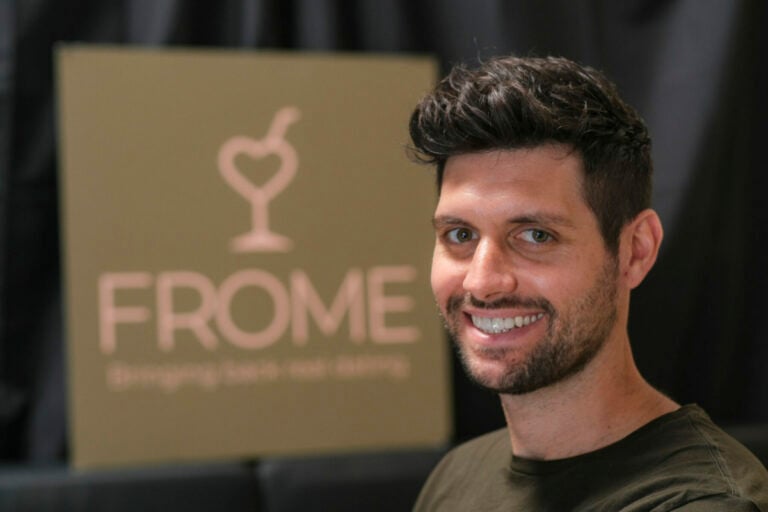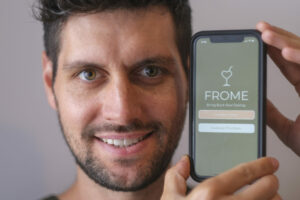
The online dating industry — fueled by the pandemic — has experienced heavy growth in digital interactions like video calls and site visits.
The increasing interest in online dating has even led to new apps being launched including an El Segundo-based dating app called First Round’s on Me, or FROME for short, which debuted last month. The app aims to “bring back real dating.” Existing apps, meanwhile, have added new features like video calls.
Prior to the outbreak of Covid-19, online dating began to spike in popularity in 2016, when there were 241 million dating-app users worldwide. Last year, that number increased to 324 million users, according to the Business of Apps, a publication focused on app development. In addition, about 20 million people pay for premium features on the applications, the group found.
Dating apps made $5.61 billion in revenue last year, with almost $3 billion being made by Match Group, an online dating conglomerate that owns brands including Tinder, OkCupid and PlentyofFish.
Since the start of stay-at-home orders in 2020, more people turned to online dating apps to form connections during the lonelier times of self-isolation, and dating apps had to adjust to this changing environment.
In 2021, West Hollywood-based Tinder ranked first by downloads in the United States, generating 15 million users.

In a publication titled “The Future of Dating is Fluid,” Tinder pointed out that 2020 was an outstanding year for the company, writing, “It’s been our busiest year in our history, and it’s going to be a completely new decade of dating.” According to the company, 60% of members came to Tinder because they felt lonely and wanted to connect with people, and 40% visited to see new and different people.
Changing environment
As with any evolving market, companies have to change based on the desires of consumers, or risk being left behind. During the pandemic, dating app companies had to find a way to cross the borders between being online and offline, while remaining as safe as possible.
When users were forced to eliminate in-person meetups, they instead turned to virtual dates and video chatting. Tinder reported that nearly 50% of its Gen Z users participated in a video chat with a match during the beginning of the pandemic, and a third were partaking in an increased number of virtual shared activities, such as playing online video games together. According to a survey conducted by the company, those who tried virtual dating saw it as a low-pressure way to get a sense of someone and their personality. In April 2020, subscriptions to eHarmony increased by more than 50% during the first week of lockdown, and have remained steady since, according to eHarmony. Likewise, the company saw a 27% increase in messages in April compared to March as social distancing and stay-at-home restrictions were in place.
During the same month, the company released a new feature called “Video Date,” aimed at helping users continue to form connections while practicing social distancing. This helped refuel conversations on their platform.
“We have a strong global team and we’re incredibly proud that our team was able to respond to emerging customer needs in such a short time all while working from home,” said Gareth Mandel, chief operating officer of eHarmony, in a statement announcing the new feature in 2020.
But it’s not all good news for dating apps. In a letter to shareholders released on August 2, Match Group chief executive Bernard Kim announced Renate Nyborg’s departure from Tinder citing that current revenue growth expectations for the second half of the year are below expectations.
Going old school
Hannah Shimko, the communications and policy director at the Online Dating Association, said that a majority of dating-app users are looking to find love and genuine connections.
The ODA is a London-based trade association that aims to act as a voice for the online dating industry.
She said that 50 years ago, an individual’s dating pool was much smaller, but online dating has widened the possibility of finding connections from other places and with people with similar interests.
Shimko added that the pandemic made people more comfortable with being online, but with such a large dating pool comes problems such as “swiping” on hundreds of people and then not meeting in person.
Tinder, however, reported that people are using the app differently now and looking for authentic connections.
“Conversations got 33% longer during the pandemic as members turned to Tinder as a lifeline to combat loneliness and make connections while the world was closed,” the company wrote in an email.
Shimko added that new companies are trying to be innovative about bringing back in-person dating while still giving users the opportunity to maintain a digital distance.
“There’s a lot of startups who are looking at … [the] movement online about wanting to meet kind of old fashioned, in-person, while keeping the opportunities that online dating gives you, [and looking at] the challenges around fraud, around safety,” she said.
That is what motivated Joseph Feminella to launch FROME. In 2016, the then 26-year-old Feminella moved to New York City and realized the heavy gravitation people his age had towards online dating applications. “I started to get on the dating apps, and I saw how everyone just hated them, so I was like, I have to try and make a way where people can still use dating apps, but it’s more organic and more old school,” Feminella said.
With the newfound free time he acquired during the pandemic, Feminella got together with a designer and a coder who were friends of his and started to make FROME a reality. The app first appeared in March of last year; however, Feminella said the company didn’t have the funds for proper branding or marketing until they got a major investor and were able to rebrand and re-release the app. The app now has about 2,000 users.
Here’s how it works: when users sign on, they can choose “available today” or “available this week” to set up a date sometime within the following seven days. When a user is interested in someone, they will send an invitation with a day, time and place. Once the other user confirms, they are locked to each other for the day and cannot connect with anyone else on the app in order to put more value on a single connection instead of swiping with several people at once. The messaging function only opens up two hours before the date begins, further enforcing the idea that people focus on connecting during their date.
Safety is a major concern for many when it comes to online dating and Shhimko said many dating companies are now trying to make their apps safer.
To make FROME safe, Feminella is implementing a check-in feature.
“We want to make the app as safe as possible again, especially for women,” Feminella said. “We’re going to come out with a feature where two hours into your date, you’re going to get an alert [asking], ‘are you okay,’ and if you hit no, we’re going to have a direct link to send an emergency text message to a friend so that someone’s alerted that you’re not having a good time.”
The company has also collaborated with L.A.-based bars and coffee shops, including Cha Cha Matcha, Juneshine, Library Alehouse, Independence Bar and Bravo Toast, to offer their users discounts for having dates at those locations. Staying true to its name, FROME paid for users’ first drink, essentially buying beverages in exchange for app downloads, at popup events.
Feminella is talking about implementing a subscription model to make additional capital with the app. If users pay the premium fee, they could send messages along with their date request, have longer chat windows and the ability to save profiles for later in case a user has already set up their limit of seven dates.
Feminella is also considering adding another revenue stream similar to ads. “Once we get a little bigger, we’re going to have different alcohol or beverage brands and coffee shops and bars kind of fight for space on our app to be recommended so that we could channel all of our dates to them,” he said.
